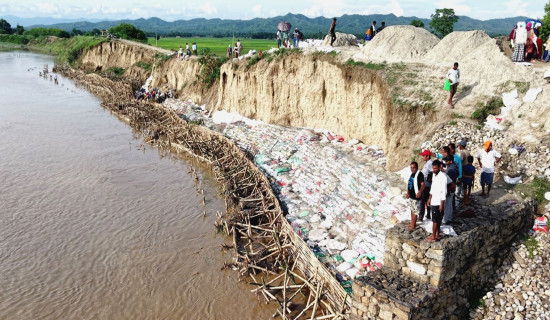- Wednesday, 16 July 2025
Wear A Quality Helmet
Nepal's highways are turning into death traps, with an increased number of motorbike accidents causing a public health crisis. Motorbikes, outnumbering more than 80 per cent of the country's registered vehicles, are the favoured method of personal mobility, as they are affordable and easy to negotiate. But this ease is being bought with a hefty price tag — lives. The latest statistics from the Nepal Police reveal that more than half of the accidents — 57 per cent — were motorcycle accidents. The death of pillion riders accounted for 26 per cent, while only 27 per cent of all motorcycle trips comprised double rides.
Overspeeding, careless driving, improper helmet use, and drunken driving are the leading factors behind the deadly accidents. The country witnessed a minimum of 75 road accidents on average every day, with seven people losing their lives. Between mid-December and mid-January of 2025, the police registered 2,276 accidents resulting in 197 deaths. The World Health Organisation (WHO) has always expressed concern about motorcycle accidents and the fact that wearing quality helmets is a good safety measure to avoid death and serious injury. The WHO has also reaffirmed that the government should enable the supply of quality helmets as part of the United Nations' "Decade of Action for Road Safety 2021–2030", which has been ratified by Nepal.
Despite repeated campaigns and public awareness drives, these habits persist, indicating a deep-seated flaw in the country's road safety regulations. However, one neglected aspect that makes these accidents more fatal is the cheap quality and inappropriate wearing of helmets. No secret exists that a helmet is the difference between life and death during a motorcycle accident. Despite this, numerous riders either do not wear helmets at all or wear substandard ones. To make matters even worse, helmets are often shared or fitted poorly, significantly diminishing their protective qualities. This shows the enforcement loopholes, and a lack of public education, and institutional responsibility.
Nepal has a national helmet standard supported by the Nepal Quality Council, which prescribes some size, weight, and impact resistance specifications. Standards are nothing, however, if they are not enforced. Shelves are stacked with uncertified helmets that crumble when hit, offering zero protection. Without strict monitoring and penalties, these deadly items will continue to sell — and be worn. Nepal Police's latest initiative to compel pillion riders to wear helmets on official vehicles during the UN Global Road Safety Week is a welcome step. It's a sign that road safety begins with a civic road culture. However, a single policy change will not address a system of emergencies.
The government needs to have a cohesive, multi-faceted strategy. First, the government has to tighten helmet regulations. Inferior helmets should be prohibited, and routine checks should be made to confirm adherence. Secondly, public awareness campaigns must emphasise that people need certified, good-fitting helmets. Individuals must know that a helmet is not an empty requirement — it's a lifesaver. Moreover, infrastructure must be adjusted to protect vulnerable road users. Dedicated lanes for motorcyclists, increased road signs, and better emergency services are required.
Drunk or reckless driving must result in severe punishments, not fines. Internationally, road traffic accidents are the number one killer of individuals aged 5–29, and a quarter of all deaths include pedestrians or cyclists. This is not Nepal's issue alone—it is an epidemic worldwide. But individual actions do make a difference. If appropriately broadened and enforced, Nepal's new helmet law can save hundreds of lives. Essentially, road safety is a matter of respecting the life of every human being—on a motorbike, in a vehicle, or on the roadside.
















